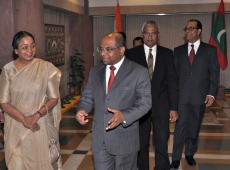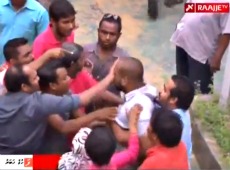The Maldives Elections Commission has reduced the number of ballot boxes to be provided for the presidential elections by 97, partly in response to resort and staff requests, but also to improve speed and efficiency by increasing the number of voting booths, officials and vote counters at each location.
A total of 459 ballot boxes – reduced from the 556 initially announced – will be required for the September 7 presidential elections, Elections Commission (EC) President Fuwad Thowfeek told Minivan News today (July 2).
“Our earlier prediction was that we’d have to place about 100 ballot boxes to cover the resorts,” said Thowfeek. “But we’ve now decided to place ballot boxes in just 56 resorts because some of them do not want boxes placed on their islands.”
“As an alternative, we’ll place boxes in the islands closest inhabited island and they’ll send their employees [to vote],” he continued.
“Resorts cannot stop their staff from going [to vote] because we have an understanding, an arrangement with them,” he declared. “If they try to stop [their employees from voting] we will take the necessary actions [against them].”
The EC will also place ballot boxes in foreign countries that have a “sizable” Maldivian population, with locations to include: Colombo, Sri Lanka; Trivandrum and New Delhi in India; Kuala Lumpur, Malaysia; Singapore; and London, UK.
“In placing ballot boxes abroad, we’ve considered places where a minimum of 100 people are predicted to register. We’ll open for registrations tomorrow. A total of six boxes will be placed in five countries,” noted Thowfeek.
The EC also plans to place 284 ballot boxes on all inhabited islands, while five boxes will be placed on five different commercial islands, said Thowfeek.
Additionally, all prisons and detention centers will have ballot boxes, five to be placed in each of the five different detention facilities. Male’ will have 103 ballot boxes total, with 48 for Male’ inhabitants and 55 for residents from the islands.
The previous EC estimate of 556 ballot boxes needed would have provided an additional 100 compared to the 2008 presidential election, however now the numbers are nearly on par.
“We thought to include more ballot boxes in Male’ also, however after a lot of work and discussion the EC thought this might not be the proper time to redistribute the ballot areas,” said Thowfeek.
“We want to facilitate voting and the concern was if we split the assigned ballot box areas, people might find it more difficult to understand where the new polling places are,” he continued.
Thus, ballot boxes will remain in the same areas as during the 2011 local council elections.
“Instead of increasing the number of ballot boxes or polling areas, we decided to increase the number of voting booths, officials and vote counters,” said Thowfeek. “This will increase the speed and efficiency.”
“Whereas previously there were seven officials per ballot box, now there are 11, where there was one voting table now there are two, and now there will be two to three booths instead of just one,” he explained. “However, where there is a population of 700 or less seven elections officials will still be present.”
“In addition to the ballot box, there will be EC staff, observers and officers at all polling places,” he noted.
“Voter registration is available from July 1 to August 7,” Thowfeek added.
Resort staff voting
Although the EC’s first assumption was that each resort would need a ballot box, this has been revised based on requests from resorts and Maldivian resort staff.
 “The EC decided to do the most appropriate and problem-free thing that will work best for resort staff and the resorts,” Thowfeek stated.
“The EC decided to do the most appropriate and problem-free thing that will work best for resort staff and the resorts,” Thowfeek stated.
“It’s not that the resorts are not allowing ballot boxes, they have requested the EC to not keep it on their islands. Instead they will be sending their staff to nearby inhabited islands,” he continued.
“It is their preference, it’s more comfortable so the resort is not disturbed by the activity of the day,” he explained. “They will provide the transportation and make all the arrangements, like splitting their staff into groups. When one group goes [to vote], another will come [back to the resort].”
“Resort management has already informed the EC as to the nearest inhabited island to which they will be sending their staff to vote,” Thowfeek continued.
“[Additionally] some resort staff feel more comfortable going to the next island because some staff say if the ballot box is kept on the resort island they are concerned their management might know who voted for certain candidates,” he said.
“In the past this [arrangement] was made for the local council elections,” he added.
While this agreement was made with understanding that resorts will honor their pledges to allow Maldivian staff to vote, other logistical complications that may hamper voters on election day have also been addressed.
“If poor weather conditions affect transportation on the day of elections, the EC members will decide steps to allow resort staff to vote,” said Thowfeek. “If such a thing happens – weather or any other unexpected events – we will see what we can do to find a solution.”
EC Hotline Help
The EC has stressed that they wish to hear any and all issues, concerns, or complaints voters may have in regard to the upcoming elections.
“We are here to listen and check into any problems,” said Thowfeek. “Anyone can call the EC regarding any problem, we currently have 12 lines and will increase the number of reception lines as demand increases.”
Currently the EC hotline is staffed 8:00am to 8:00pm, however as elections day approaches the line hours will be extended, Thowfeek explained.
Maldivians can call or SMS to determine where they are registered to vote, which political party they are registered with, to report any problem or difficulties, and to seek any information.
The Elections Commission hotline is 1414.
The SMS codes for enquiries are as follows:
SMS PPR(space)(ID#) – current political party registration
SMS Voterinformationsystem(space)(ID#) – respective polling place location based on voter registration
Additionally, voter registration, including political party affiliation, can be verified in the Maldives’ government gazette.




